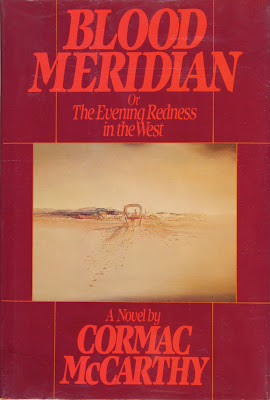Live Blog: Blood Meridian Part One
Since I plan on spending the better part of this summer and semester researching and writing about this classic piece of American literature. I figured I could document my progress and for those interested in seeing a developing thesis process. Here ya go.
To begin things I will include an interview of myself by myself conducted on the 10th of June 2012.
RP: Why did you choose Blood Meridian as the main focus for you Senior Thesis?
RP: Hm. good question. Well, I have always been fascinated with the human species's ability to commit acts of violence when we are constantly conditioned to be good humans. However, to make it even more interesting lets include American humans--or better yet American humans in the 19th century. A lot of what is American today is based out of the 19th century and most philosophical American ideas stem from the American Romantic period and definitions of what it means to be American are defined as well by the likes of Walt Whitman, Henry David Thoreau, and Ralph Waldo Emerson. But also meditations on the human condition are also discussed in novels by Nathaniel Hawthorne and Herman Melville. So it feels that as a contemporary novel Blood Meridian touches upon (similar to Toni Morrison's Beloved) the 19th century and the violence that has stemmed from it.
RP: What do you think are the contributing factors of American violence in the 19th century?
RP. I always look at the idea of Manifest Destiny. Blood Meridian really captures this idea of American Westward expansion and grasps the concept for capitalist dominance that fueled the fire of Judge Holden and many other characters in the novel. So in a way I want to explore this speck of Manifest Destiny as history that has been created by economic interest in the West during the Mid-19th century.
RP: What else interests you about the novel?
RP: I feel that Blood Meridian is a document of American past even though it is a fictional account of a true story it demystifies our vision of American's fairy tale West. If you think about it a cowboy was not just shot and quickly buried usually they set out bloated and were picked to pieces by scavengers of the land. Dried pools of blood lying upon the sand in some ways giving meaning to Cormac's subtitle to the novel The Evening Redness in The West. The red hue created by Westward expansion. Americans still have a lot of blood on their hands in their own land let alone the rest of the world.
More to come from this interview later, stay tuned.



Comments
Post a Comment